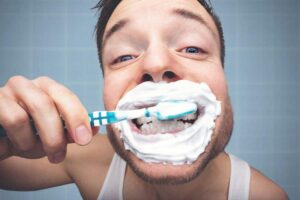
With the thousands of toothpaste varieties out there and the complex advice about what to do during brushing it’s no wonder many of us don’t know how to properly brush our teeth!
But have no fear — this blog post will break down all the components necessary for a healthy oral care routine so that readers everywhere can learn just how important proper teeth brushing is and get back on track with keeping their pearly whites well looked after!
The Importance of Brushing Your Teeth
As dentists everywhere will tell you, brushing your teeth is one of the most important steps you can take to maintain good oral hygiene. Regular brushing helps to remove plaque, bacteria, and food particles that can lead to tooth decay, gum disease, and other oral health problems.
While it may seem like a mundane task, brushing your teeth twice a day for two minutes each time can make a big difference in your overall health. So make sure to take the time to brush properly, using a fluoride toothpaste and a soft-bristled toothbrush to keep your teeth and gums clean and healthy. Your smile (and your dentist) will thank you for it!
How To Properly Brush your Teeth?
Here’s a step-by-step guide on how to properly brush your teeth:
- Wet your toothbrush: Wet your toothbrush with water to help spread the toothpaste evenly over your teeth.
- Apply toothpaste: Apply a pea-sized amount of toothpaste onto your toothbrush. Use a toothpaste that contains fluoride, as fluoride helps protect your teeth against cavities.
- Brush the outer surfaces: Start by brushing the outer surfaces of your teeth. Place the bristles at a 45-degree angle to the gumline and use gentle circular motions to clean the front, back, and top of each tooth. Be sure to brush all the way to the back teeth.
- Brush the inner surfaces: Next, brush the inner surfaces of your teeth. Tilt the brush vertically and use gentle circular motions to clean the inside of the front teeth.
- Brush the chewing surfaces: To clean the chewing surfaces of your teeth, use a back-and-forth motion. Be sure to brush the tops of your molars, which are the large teeth in the back of your mouth.
- Brush your tongue: Bacteria can also accumulate on your tongue, so be sure to brush your tongue gently to remove any bacteria or debris.
- Rinse your mouth: After brushing, rinse your mouth thoroughly with water to remove any remaining toothpaste and debris.
- Spit out the toothpaste: Spit the toothpaste out into the sink. Do not swallow the toothpaste, as it contains fluoride which is not meant to be ingested.
- Rinse your toothbrush: Rinse your toothbrush thoroughly with water and store it in a clean, dry place.
- Floss your teeth: Floss your teeth at least once a day to remove plaque and food particles from between your teeth and below the gumline.
Remember to brush your teeth for two minutes, twice a day, and to replace your toothbrush every three to four months or when the bristles become frayed. Also, be sure to schedule regular dental check-ups and cleanings with your dentist to maintain good oral health.
Is Mouthwash an Alternative to Brushing Your Teeth?
Mouthwash is not a substitute for brushing your teeth, but it can be a helpful addition to your oral hygiene routine. Mouthwash can help freshen your breath and kill bacteria in your mouth, but it does not remove plaque and food particles from your teeth like brushing does.
Brushing your teeth is still the most effective way to remove plaque and bacteria from your teeth and gums, as well as to prevent cavities, gum disease, and bad breath. The physical action of brushing helps to dislodge food particles and bacteria from the surface of your teeth and gums, which can then be rinsed away with water.
Mouthwash can be used as a supplement to brushing and flossing, but it should not be used as a replacement. Using mouthwash after brushing and flossing can help to rinse away any remaining bacteria and debris in your mouth and freshen your breath.
It’s important to note that not all mouthwashes are created equal, and some may contain alcohol or other ingredients that can be harmful to your oral health. It’s a good idea to talk to your dentist or dental hygienist about which type of mouthwash is best for you based on your individual oral health needs.
If you’re interested in learning more about oral health, we invite you to explore our website for other informative articles and resources. Our website is a great source of information on a wide range of dental topics, including preventive care, cosmetic dentistry, and restorative procedures.
And if you’re looking for a trusted dental clinic to help you achieve optimal oral health, we encourage you to schedule an appointment with us today. Our team of experienced dental professionals is dedicated to providing our patients with the highest quality of care in a comfortable and welcoming environment.

